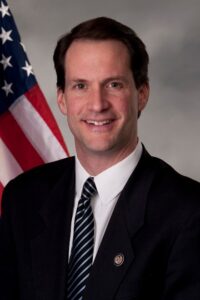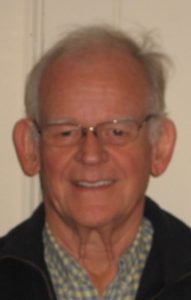 Jim Himes represents Connecticut’s 4th District in the United States House of Representatives where he is serving his eighth term. He serves as Ranking Member of the House Permanent Select Committee on Intelligence, and on the House Financial Services Committee.
Jim Himes represents Connecticut’s 4th District in the United States House of Representatives where he is serving his eighth term. He serves as Ranking Member of the House Permanent Select Committee on Intelligence, and on the House Financial Services Committee.
Jim grew up as the child of a single working mom in a small town. As a member of Congress, Jim works hard to provide all American children the same opportunities he had to succeed: access to a first-rate public school, affordable and effective health care, a decent and safe home, and a supportive community.
Born in Lima, Peru in 1966 to American parents, he spent the early years of his childhood in Peru and Colombia while his father worked for the Ford Foundation and UNICEF. As an American abroad, Jim grew up fluent in both Spanish and English and was raised with an awareness of the unique position of the United States in the world. At the age of ten, Jim moved with his mother and sisters to the United States.
Jim graduated from Hopewell Valley Central High School and then attended Harvard University. After completing his undergraduate work, Jim earned a Rhodes Scholarship, which enabled him to attend Oxford University in England where he continued his studies of Latin America, including research in El Salvador.
Prior to his service in Congress, Jim ran the New York City branch of The Enterprise Community Partners, a nonprofit dedicated to addressing the unique challenges of urban poverty. Jim’s team led the way in financing the construction of thousands of affordable housing units in the greater New York metropolitan region, often using new green technologies to achieve energy efficiency and reduce utility costs.
Jim’s experience at Enterprise spurred his involvement in politics. Putting his expertise in affordable housing to work, Jim served as a Commissioner of the Greenwich Housing Authority, ultimately chairing the board and leading it through a much-needed program of reforms. Jim went on to become an elected member of his town’s finance board, setting tax and budget policy for Greenwich. Jim has also served as Chair of his local Democratic Town Committee, organizing others in the community to become more active in the political process.
Jim began his professional career at Goldman Sachs & Co. where he worked his way up to Vice President over the course of a 12-year career. He worked extensively in Latin America and headed the bank’s telecommunications technology group there. Jim and his wife Mary live in Greenwich (with not frequent enough visits from their daughters Emma and Linley).
Summary
Himes Defends Democracy, Critiques Both Parties in Wide-Ranging Talk
At a packed event hosted by the Darien Men’s Association, Congressman Jim Himes delivered a sweeping, often unsparing assessment of America’s political and institutional health—criticizing both Donald Trump’s Republican Party and his own Democrats, while expressing cautious optimism that democratic norms are holding.
Himes, now in his ninth term representing Connecticut’s 4th District, opened with a reflection on America’s political evolution. He noted the shift in once reliably Republican towns like Darien, New Canaan, and Greenwich toward the Democratic column—a change he attributes to rising education levels and discomfort with MAGA populism.
“There are lots of reasons to be worried,” Himes said, citing threats to democratic norms, attacks on immigrants, and hostility toward academic and scientific institutions. But he pushed back on the notion that the U.S. is already in constitutional crisis, praising the judiciary for consistently restraining executive overreach. “The courts have held,” he said, referencing over 240 decisions that have blocked controversial policies.
Himes, who serves as the ranking Democrat on the House Intelligence Committee, reserved sharp criticism for the Trump administration’s tariff policy. He argued that tariffs have worsened inflation and misunderstood basic economics. “Trump sees tariffs as a tax on China,” Himes said, “but that’s not how tariffs work.” While he predicted short-term pain—higher prices for cars and consumer goods—he called tariffs a “self-correcting” problem due to inevitable backlash from consumers and markets.
Even as he criticized the former president, Himes had tough words for Democrats. He said voters’ top complaint isn’t about “wokeness” or spending—it’s that Democrats appear incapable of delivering results. He pointed to the failure to build a single electric vehicle charging station in Connecticut after the passage of the Inflation Reduction Act. “People aren’t stupid,” he said. “They see that.”
He praised a new “abundance movement” emerging in Democratic circles, which seeks to streamline infrastructure approvals and deliver tangible benefits faster. As one example, he cited a small long-delayed bridge replacement project in Greenwich that has taken eight years to begin, when the Empire State building was completed in just over a year.
Turning to foreign policy, Himes was blunt: “Most of our biggest mistakes since the 1960s have been mistakes of idealism.” He critiqued America’s overreach in Vietnam, Iraq, and Afghanistan, praising President Biden’s instinct to avoid new military entanglements. While he acknowledged the administration’s failures in handling Ukraine aid early in the war, he warned against full U.S. withdrawal. “If Putin comes away from this thinking it was worth it, we should brace for what comes next,” he said.
On national security, Himes criticized reports that a Qatari-donated plane might be used for presidential travel, calling it a “terrible idea” from a security standpoint, given the role Air Force One plays in providing a secure base from which a president must lead in some emergencies. It will likely have to be taken down to its rivets to rebuild as a secure and effective communications center. He also addressed the “Signal Gate” scandal, in which sensitive communications were conducted over unsecured channels. These lapses, he said, show what happens “when you put responsible people in a clown-like environment.”
During a Q&A session, Himes fielded pointed questions from a self-described MAGA Republican in the audience, who expressed concern about Connecticut’s taxes, energy prices, and population trends. Himes responded by noting economic growth in Fairfield County, but acknowledged broader state challenges. He tied high energy prices to limited natural gas infrastructure and called for modernizing Connecticut’s grid and transit systems.
He also drew a hard line on constitutional issues. “You can disagree with me on taxes and immigration,” he said. “But the Constitution isn’t optional. We don’t get to suspend it because someone is unpopular.”
Asked who leads the Democratic Party today, Himes admitted “we don’t have a figurehead.” He predicted Democrats would likely retake the House in 2026 but warned that the current leadership vacuum is demoralizing to activists.
In a closing question, Himes was asked whether the so-called “big, beautiful” Trump-backed tax bill could hurt the U.S. credit rating. He said the legislation would add $3 trillion to the deficit over 10 years and noted growing market concerns. “There may come a point,” he said, “when the capital markets finally say, ‘enough.’”
Despite his many critiques, Himes ended on a cautiously hopeful note. While he acknowledged deep polarization and rising acceptance of political violence, he expressed faith that institutions—and voters—still have the power to restore balance.
“I don’t think we’ve crossed the line,” he said. “And I don’t think we will.”
Video Presentation
 An Instant New York Times Bestseller
An Instant New York Times Bestseller


 In announcing Erin’s appointment last August as executive director of the DCA, the board described Erin as a seasoned executive with over 25 years of experience in the development of business and brand strategies, digital and communication plans, and integrated campaigns for some of the world’s most recognized and most well-loved brands. Those brands included Nike, ESPN, American Express and Pepsi. She has brought her vision and experience to bear on revitalizing the DCA for a new era.
In announcing Erin’s appointment last August as executive director of the DCA, the board described Erin as a seasoned executive with over 25 years of experience in the development of business and brand strategies, digital and communication plans, and integrated campaigns for some of the world’s most recognized and most well-loved brands. Those brands included Nike, ESPN, American Express and Pepsi. She has brought her vision and experience to bear on revitalizing the DCA for a new era. Jim Himes represents Connecticut’s 4th District in the United States House of Representatives where he is serving his eighth term. He serves as Ranking Member of the House Permanent Select Committee on Intelligence, and on the House Financial Services Committee.
Jim Himes represents Connecticut’s 4th District in the United States House of Representatives where he is serving his eighth term. He serves as Ranking Member of the House Permanent Select Committee on Intelligence, and on the House Financial Services Committee.